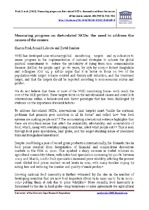| dc.contributor.author | Friel, S. | |
| dc.contributor.author | Labonte, Ronald | |
| dc.contributor.author | Sanders, David | |
| dc.date.accessioned | 2017-06-28T10:19:45Z | |
| dc.date.available | 2017-06-28T10:19:45Z | |
| dc.date.issued | 2013 | |
| dc.identifier.citation | Friel, S. et al. (2013). Measuring progess on diet-related NCD's: the need to address the causes of the causes. Lancet, 381 (9870): 903–904 | en_US |
| dc.identifier.issn | 0140-6736 | |
| dc.identifier.uri | http://hdl.handle.net/10566/3009 | |
| dc.identifier.uri | http://dx.doi.org/10.1016/S0140-6736(13)60669-8 | |
| dc.description.abstract | WHO has developed nine voluntary global monitoring targets and 25 indicators to assess progress in the implementation of national strategies to achieve the global political commitment to reduce the probability of dying from non-communicable diseases (NCDs) for people aged 30–70 years, by 25% by 2025.1,2 Robert Beaglehole and colleagues (Oct 13, p 1283)3 argue that it is better to focus on two of the population-wide targets: tobacco control and dietary salt reduction, and the treatment target, and that the targets should be reported according to socioeconomic status and gender. | en_US |
| dc.language.iso | en | en_US |
| dc.publisher | Elsevier | en_US |
| dc.rights | Publisher retains copyright. Authors may archive the published version in their institutional repository. | |
| dc.subject | Measuring progress | en_US |
| dc.subject | Diet-related NCDs | en_US |
| dc.subject | Address | en_US |
| dc.subject | Causes | en_US |
| dc.title | Measuring progess on diet-related NCD's: the need to address the causes of the causes | en_US |
| dc.type | Article | en_US |
| dc.privacy.showsubmitter | FALSE | |
| dc.status.ispeerreviewed | TRUE | |
| dc.description.accreditation | Department of HE and Training approved list | |

